by Mary Bailey
Meet the Horns, the De Boers and the Irvings.
They are examples of the renaissance in the traditional family farm, preferring to take a hands-on approach with both their animals and their customers. As we crave a more direct relationship with our food, families such as these are fulfilling the desire.
They are by no means the norm. It’s not easy being an outlier. It takes youthful energy, farming smarts, an entrepreneurial attitude and loads of hands-on work. Is it worth it? Here are their stories.
Tangle Ridge Ranch, Thorsby
Shayne and Vicky Horn • tangleridgeranch.ca
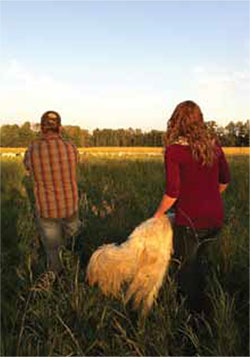
This turned out to be a good thing.
They married, then moved to the ranch in the same week. “We wanted to get the really physical stuff done that first year, before I got pregnant, and we were wellversed in fencing.”
Shelby, now three, came along, and the couple has a new baby due in mid-September.
“I had wanted to be a vet. The ranch manager I had worked with as an intern challenged my thinking; ‘take care of the land, it will take care of the animals. If you’re a vet you’re always just treating the symptoms.’ I fell in love with the concept of using the animals as tools to manage your land, and in return the land provided health benefits and nutrition to the animals.”
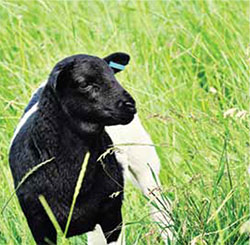
“We started with 25 ewes the first year, now we have 140 ewes and 212 born. We will sell 180 this fall. We try to buy a few ewes each year to help us grow faster.”
“How do we want things to look in five years? We want to have 250-300 ewes, continue to directmarket all of our lamb, and continue to create a healthy land base. That means we will have achieved our goal — a sustainable family farm in a healthy community.”
Irvings Farm Fresh, Round Hill
Nicola and Alan Irving • irvingsfarmfresh.com
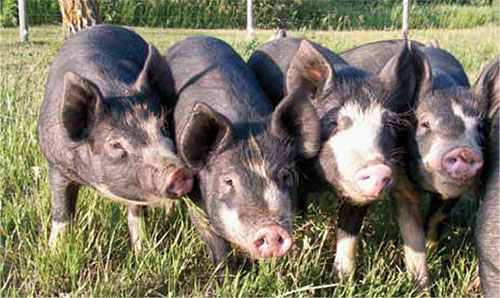
Nicola and Alan Irving started their family business in 2006. Nicola had worked in agriculture in Britain as a dairy nutritionist. “I would go around and talk to dairy farmers about how to reach higher yields of protein and butterfat. It didn’t translate to pigs at all.”
The Irvings raise Berkshire, a notoriously slow growing but delicious-tasting black pig.
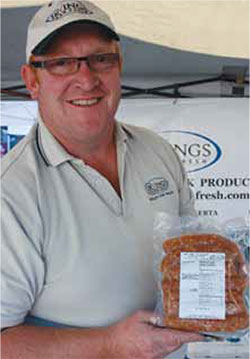
Self-feeding stations? Nicola says pigs don’t pig out. They know it’s there; they eat when they are hungry.
I asked Nicola what’s changed the most in the past six years.
“The volume we now sell and day was fantastic. Now we make 500 pounds in a half-day. We learned better methods and have so much bigger machinery. We’re better, quicker and faster at what we do. We still do it all by hand, we had to hire help to make it work, but what we pay out in labour is worth every cent.
“We were always working. The kids were suffering, getting resentful. You can do it all yourself for a few years, but at some point your family has to come first.” the time it takes us to make our product,” says Nicola. “I used to think 50 pounds of sausage in a
Four Whistle Farm, Leduc
Marius and Twiggy De Boer • fourwhistlefarm.ca
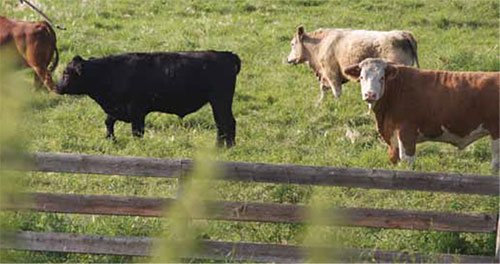
The large white Maremma sheepdogs, Heidi and Curly, fall upon us with joyful abandon. But they don’t want to follow us into the turkey pasture. These two, who take after coyotes with steely-eyed precision, are not particularly fond of turkeys.
The turkeys are curious, and after a few moments of checking us out, settle to wandering about picking at bits of grass, making happy turkey sounds.
The cattle move along the far fence silhouetted against the sun. It is lovely.
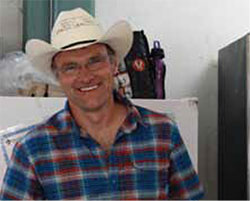
It sounds like a lot of work. It is a lot of work, and Twiggy has an off farm job as well.
“It is getting harder to find reliable labour for a reasonable price, especially because so much of our work is by hand,” Marius gestures at the 30 or so little pigs behind us.
“But I spend less time in the truck. We have found good processors closer to the farm. I go to Pigeon Lake now instead of St. Paul for the poultry, for example.
“We’re selling more beef and less lamb, perhaps because there are more people selling lamb at farmers’ markets now.”
At the Old Strathcona Farmers’ Market, where Four Whistle Farm has had a booth for several years, everybody knows the tall Dutchman with the white cowboy hat and wide grin.
“I would have to say the interaction with our customers is my favourite thing.
“Where do we want to be in five years? We hope to have good solid growth, to have reliable help — to have everything a bit easier, maybe time for a little holiday once in awhile.”